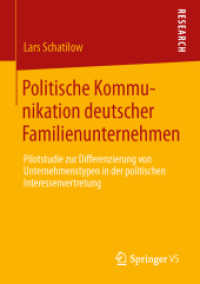- ホーム
- > 洋書
- > 英文書
- > Business / Economics
Full Description
The Handbook of Artificial Intelligence in Water Management explores the intersection of artificial intelligence (AI) technologies and water management strategies aimed at achieving net zero emissions. It delves into the cutting-edge applications of AI in various facets of water resource management, ranging from optimizing water distribution systems to enhancing wastewater treatment processes.
Explaining how AI-enabled water quality monitoring systems enable faster response times to water quality issues, this book presents a wide range of AI-driven innovations from smart sensors and real-time monitoring systems to intelligent decision support tools. By leveraging advanced AI algorithms, machine learning techniques, and predictive analytics, water managers can optimize water usage, minimize energy consumption, and reduce greenhouse gas emissions across the entire water cycle for an efficient, resilient, and environmentally sustainable future. Case studies and real-world examples are included to provide a framework for implementing innovative approaches.
This book is a valuable resource for advanced undergraduate students, researchers, and industry professionals interested in utilizing AI to mitigate environmental impacts, enhance resilience, and achieve net zero emissions in water management.
Contents
Introduction. Understanding Artificial Intelligence. 1. SDG and Water: Artificial Intelligence Nexus. Part I. Water Quality and Resource Management. 2. Urban Water Management Challenges and Solutions. 3. Machine Learning, IoT, and GIS for Water Quality Monitoring. 4. Advantages and Challenges of AI-Driven Water Quality Monitoring. 5. Artificial Intelligence in Water Resource Management. 6. Water Management in the Context of Net Zero Emissions. 7. Artificial Intelligence for Global Water Security and Management. 8. Smart Water Infrastructure. Part II. Applications in Agriculture. 9. Smart Technologies to Achieve Net Zero Emissions in Food Production Systems. 10. AI-Integration for Irrigation Optimization. 11. Precision Agriculture and Water Efficiency: Predictive Analytics, Irrigation Scheduling, and Weather Forecasting Models. Part III. Climate Action and Conservation. 12. Aquatic Ecosystem Preservation using Artificial Intelligence. 13. Artificial Intelligence and Water Conservation. 14. Floodplain Width Prediction in Flood Disaster Management. 15. K-Means Clustering: Geometric Design of Double-Arch Dams. 16. Water Security in a Changing World: Harnessing AI to Mitigate Climate Change Impacts. 17. Building Climate-Resilient Water Systems: Challenges, Solutions, and AI-Driven Strategies. 18. Future Trends and Emerging Technologies in the Integration of AI and Water Management. 19. Conclusion.








